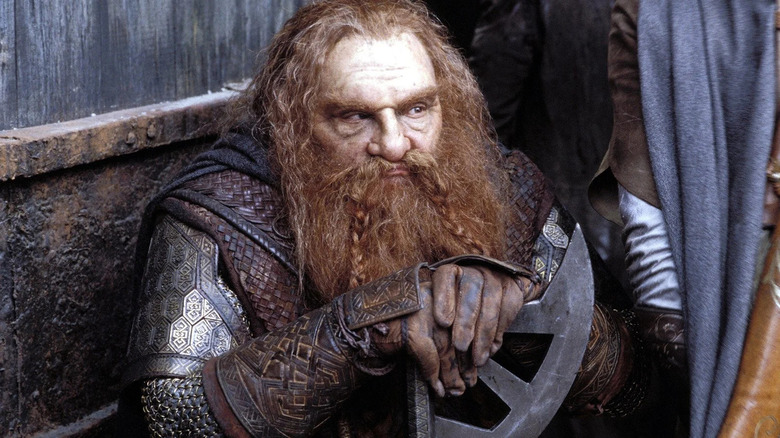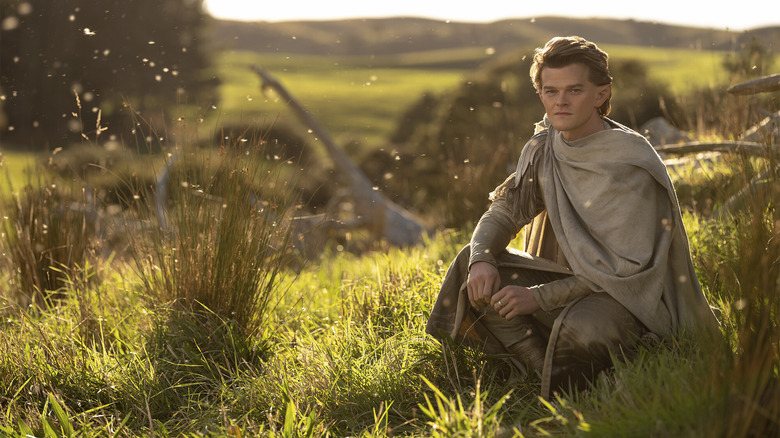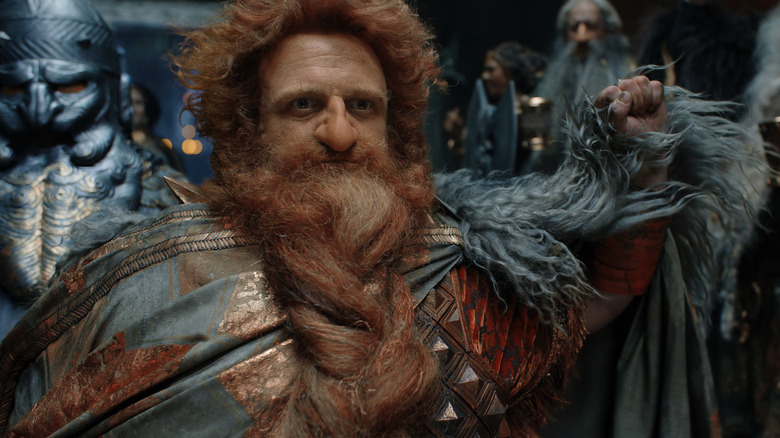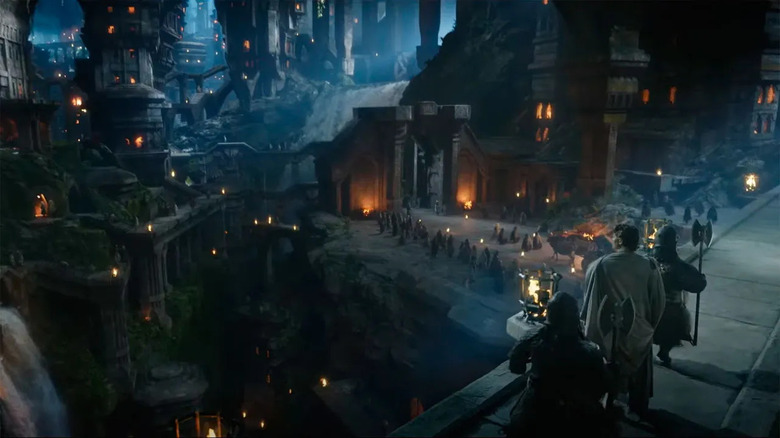Lord Of The Rings: The Rings Of Power Improves One Of The Best Parts Of The Movies
The "Lord of the Rings" movie trilogy gave us many things. It gave us proof that you could make a high-fantasy movie that felt grounded, epic, and universal without being very corny. It gave us an unadaptable book adaptation that paved the way for other shows and movies like "Game of Thrones," "Dune," and "The Sandman." It also gave us incredible sets and designs that set a standard for how fantasy would look on a grand scale.
And it also gave us one of the best broships in modern cinema history in Legolas and Gimli. Alone, they already are two of the coolest characters in the trilogy. Together, their banter, knack for competition, and camaraderie makes for a legendary friendship that shows people of vastly different backgrounds. And yet, while the films spent a not insignificant amount of time in the company of elves, dwarves got kind of neglected outside of Gimli. Sure, there's "The Hobbit," but we rarely got a glimpse of what a dwarven kingdom looks like before it got destroyed by a dragon.
Luckily, we get another chance at experiencing one of the best parts of the movies over again, thanks to "The Rings of Power." The Prime Video show expands on dwarven customs and life, and shines a light on what it's like to be friends with an immortal being, thanks to the broship of Elrond Half-elven, and Durin IV, prince of Durin's Folk.
Much that once was is lost
In its first two episodes, the Prime Video show has an epic scope that feels unlike anything on TV, taking its time to reintroduce us to Middle-earth while showing it to be a much different place than we've seen before. This is a Middle-earth that's gone through unspeakable tragedy, and is awaiting the next one. While there are clear hints of big stories being built on, like the return of Sauron that Galadriel foresees, the mystery of the meteor man, and the appearance of the titular rings, there are plenty of moments and scenes that seem to just be painting a picture of a larger world than we saw in the movies. One of those moments is the introduction of Khazad-dûm, or Moria, which in the films we only got glimpses of, as a ruin and a tomb.
In "The Rings of Power," we meet Elrond long before he became a wise leader and a grumpy old man. Here, he's a hungry elf wanting to leave his mark in history. In episode 2 he is tasked with joining Celebrimbor the master smith in the realm of Eregion, who desires to build a massive tower with a forge that can create many wonders. To help build such a thing, Elrond suggests calling on the dwarves of Khazad-dûm, as he is friends with Prince Durin IV.
But rather than the royal welcome he is expecting, Elrond is shunned and rejected by Durin. The reason? Elrond has apparently ghosted his friend for 20 years, a blink of an eye to an immortal elf, but an entire life for a mere dwarf. In that time, Elrond has missed Durin's wedding, and even the birth of his two children.
Turns out, an elf can be late
It's a short and relatively small exchange compared to the rest of the episode, but it is a hugely impactful one. It is arguably one of the most important scenes in the entire franchise in what it tells us about elves. We've already heard elves talk about their age before, of course. Elrond did tell Gandalf about being there when Sauron fell 3,000 years before "The Fellowship of the Ring," and he does talk about Arwen living on with grief after Aragorn dies, but this is the first time we see the impact of immortality on a friendship between races in a more mundane and personal way. It's one thing to imagine Aragorn dying of old age and leaving his immortal beloved to grieve alone when he looks like a young man, but it is another to see all the things Elrond missed simply because he thinks about time differently from Durin.
We know a wizard is never late, they arrive precisely when they mean to. An elf doesn't have that luxury, though. They can easily get lost in thought and lose track of time, like any other being, but in their case, it can mean years or decades. And why shouldn't it? Why should they keep track of days or months when their lives span millennia? Galadriel spends most of the first two episodes of "The Rings of Power" lamenting the death and destruction beyond measure or words that she's witnessed. With how easy it is for an adult with a job to lose track of time and forget to stay in touch with old friends, just imagine how easy it can be for a busy elf like Elrond to realize two decades have past.
A royal welcome, of a kind
In the same episode, and for the first time in the history of adaptations of Tolkien's legendarium, we get a portrayal of a dwarven city that's about more than shiny jewels. When Elrond enters Khazad-dûm, he marvels not at the sight of the miners finding treasures in the mountain, but at the sight of great buildings, structures, statues, elevator, bridges, and even greeneries around the city. He is astonished when Durin's wife, Disa, talks about molding rocks by singing to them. This helps sell Moria as the great kingdom that Gimli talked about in "The Fellowship of the Ring." Also on this episode we get an actual look at dwarven culture and traditions, with a rock-smashing contest.
With how much time we spent on kingdoms of elves and men in the movies, "The Rings of Power" is finally giving dwarves their due. Let's hope the show makes them as important to Middle-earth as elves, humans, and hobbits.
"The Lord of the Rings: The Rings of Power" is now streaming on Prime Video. New episodes stream Fridays.



